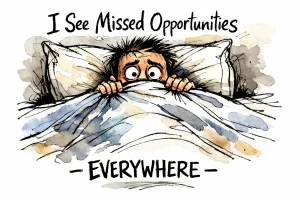
January arrived with all the rituals: a list of objectives, a brand-new planner, a motivational post on social media, and the promise that “this year will be the one.” But in the blink of an eye, Carnival arrived, an avalanche of emails piled up, daily urgencies took over – and those ambitious goals were forgotten in the digital drawer. If this description sounds familiar, you’re not alone. Research shows that around 80% of New Year’s resolutions are lost before March. So, what do we do when we realize that most of the year has already passed, and the goal-setting notebook is still empty?
But… why do we abandon our goals?
- Objectives without context: “Learn French” or “grow by 30%” sound appealing, but they disconnect from the real routine. Without a clear definition of when, where, and how to practice, the goal becomes decoration.
- Lack of intermediate metrics: Annual goals require monthly or weekly milestones. The brain needs quick wins to maintain momentum.
- Adverse environment: We are still surrounded by the same distractions and pressures. Willpower alone doesn’t overcome external triggers.
- Unrealistic self-demand: A setback becomes an excuse to give up. Missed two workouts? “That’s it.” This perfectionism sabotages consistency.
So, how do we rescue (or redefine) our objectives?
- Revisit the “why”. Ask yourself, “Does this still matter to me?” If the answer is lukewarm, discard it without guilt. Focus is a conscious choice, not a penance.
- Turn goals into systems: Replace “read 20 books” with “read 10 pages before coffee”. A daily system reduces friction and generates automatic progress.
- Break it down into 90-day cycles: A quarter is short enough to maintain urgency and long enough for tangible progress. Review goals every cycle.
- Manage the environment, not just willpower:
- Keep your phone away at night if you want to sleep early.
- Set out your workout clothes the night before.
- Use website blockers during focus blocks.
- Celebrate micro-wins. Every step counts. Recognize progress weekly to fuel intrinsic motivation.
- Find allies. Share your goals with a friend or mentor. External accountability increases your success rate.
And what if the year “is already over”? Mathematically, there are still several productive weeks left. Even if there are only 100 days left, that’s enough time to:
- Build a habit (science suggests 60-90 days to consolidate).
- Launch a micro-project to validate an idea.
- Improve 1% a day, which adds up to almost 2.7 times more in three months.
Forgotten goals are not a sign of incapacity; they are feedback on flawed methods. Instead of burying the calendar and waiting for next January, treat the “mid-year” as a new starting point. Rewrite your objectives based on reality, adopt systems, protect your environment, and celebrate incremental progress. The future doesn’t start on January 1st – it starts when you decide to hit “Reset” and get back in the game.
That’s it.





